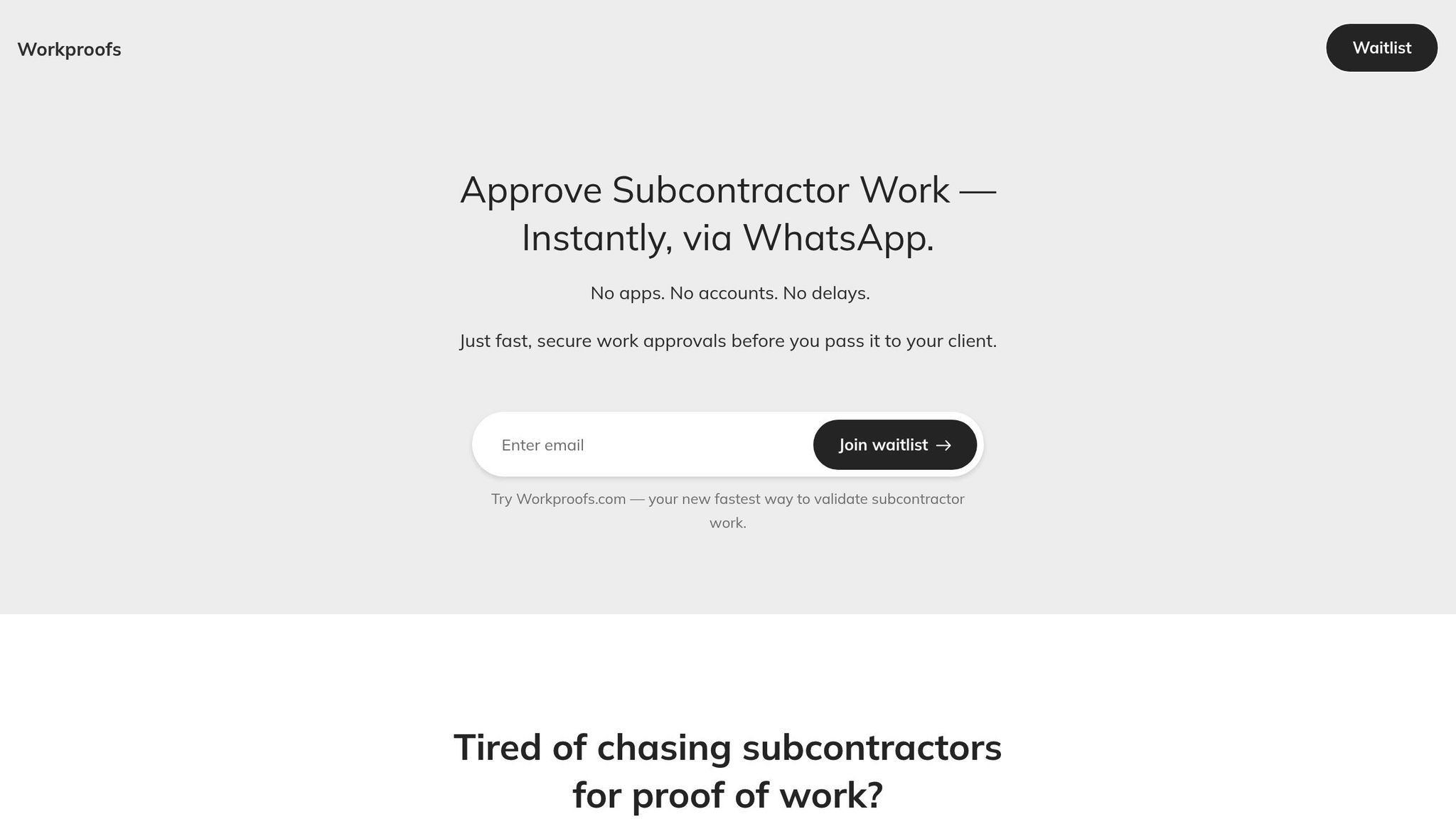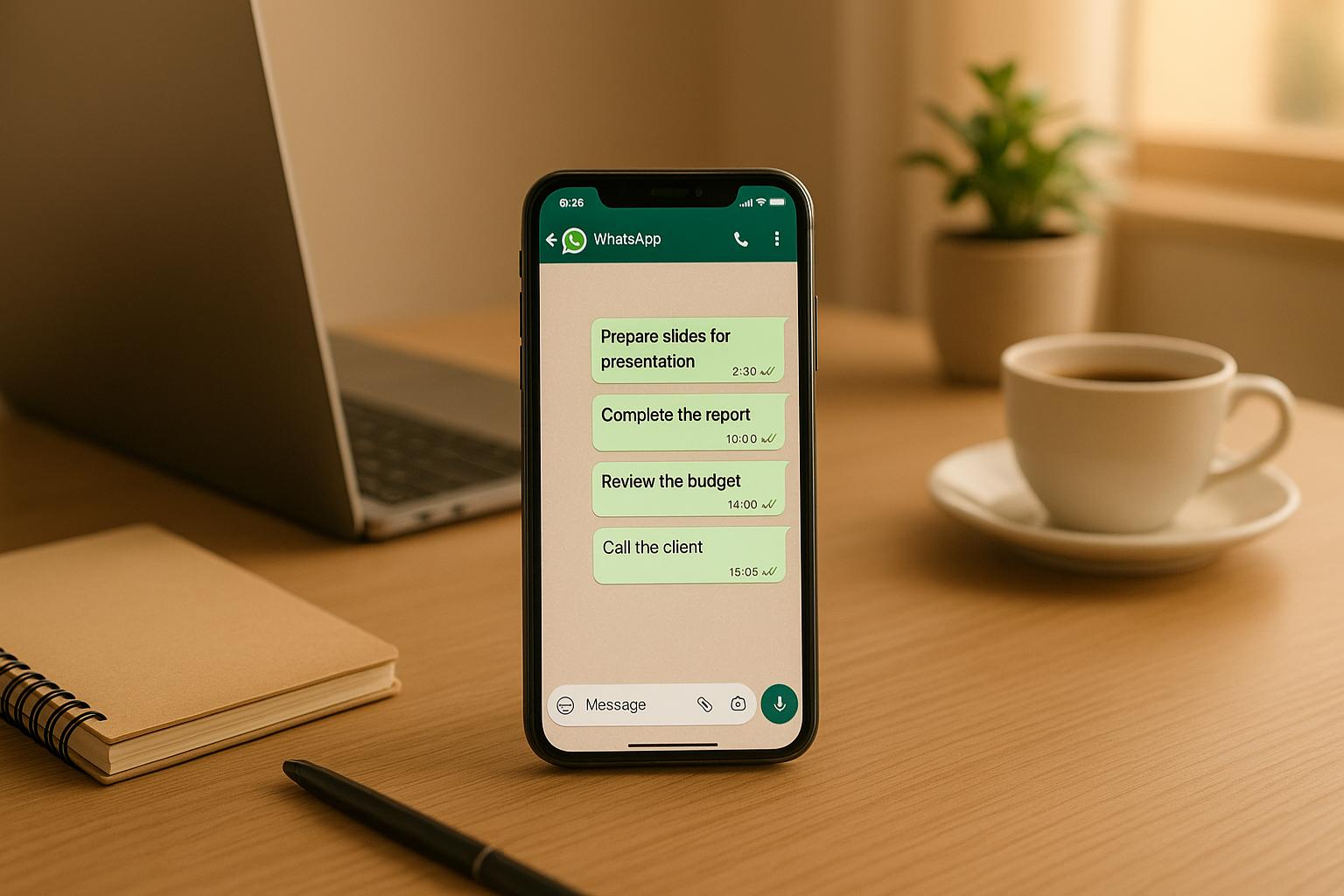Real-time work verification helps projects stay on track by addressing common issues like delays, errors, and poor communication. It ensures instant feedback, faster approvals, and better team accountability, which can dramatically reduce costs and improve timelines. Here’s why it matters:
- Fewer Errors: Immediate checks catch mistakes early, cutting down on rework and saving resources.
- Faster Approvals: Automated systems streamline workflows, eliminating bottlenecks.
- Improved Communication: Centralized updates keep everyone aligned, especially for remote teams.
- Cost Control: Companies save millions annually by reducing manual errors and inefficiencies.
For industries like construction, logistics, and creative work, tools like Workproofs.com make real-time verification simple by integrating with familiar platforms like WhatsApp. This approach not only improves project outcomes but also builds trust with clients.
If you’re tired of delays and miscommunication, real-time verification is the solution to deliver projects on time and within budget.
Technician Job Verification powered by TechSee

Common Project Delivery Problems
Project delivery challenges can drain businesses of millions of dollars. Recognizing these common pitfalls is the first step toward finding effective solutions. Below, we explore how these issues arise in communication, approvals, and error management.
Poor Communication Between Teams
When communication breaks down, projects often spiral into chaos. Consider this: 86% of employees and executives blame workplace failures on a lack of collaboration or ineffective communication. Even more alarming, poor communication costs U.S. businesses up to $420 billion annually.
One of the biggest culprits is the absence of a structured communication plan. Without clear channels for updates, questions, or clarifications, teams are left guessing, which leads to delays and costly errors. In fact, 47% of project failures are tied to issues with requirements management, and 75% of those failures stem from poor communication.
Remote and distributed teams face even greater hurdles. Language differences, time zone gaps, and cultural nuances can complicate interactions. Add to that the overwhelming volume of messages from various platforms, and it's no wonder 39% of workers say unclear communication causes disengagement. Fixing communication gaps not only speeds up delivery but also strengthens client relationships.
Slow Manual Approval Processes
Outdated approval workflows are another major bottleneck. Manual processes can drag projects down by as much as 25%, while inflating costs by 20-30%. These workflows often lack transparency, making it difficult to track progress or pinpoint who needs to take the next step. When multiple stakeholders are involved, even straightforward tasks can grind to a halt for weeks.
This inefficiency doesn’t just affect internal timelines. When clients experience delays in getting their feedback or requests addressed, they may start questioning whether their project is being prioritized. Streamlining approval processes can dramatically improve delivery speed and client satisfaction.
Higher Error Risk Without Proper Checking
Errors caused by inadequate verification can wreak havoc on budgets and timelines. Poor data quality costs organizations an average of $15 million annually. Mistakes - whether it’s a design that’s slightly off-brand or a misinterpreted construction detail - can lead to expensive rework and missed deadlines. For example, the British Standards Institution (BSI) estimates that fixing defects caused by miscommunication costs the UK construction industry about £20 billion annually.
The ripple effect of errors is hard to ignore. Studies show a 4% manual error rate, and these small mistakes can snowball across project stages, undermining quality and efficiency. Worse yet, over half of project budget risks are linked to poor communication, improper information sharing, and time management issues.
Without proper verification systems in place, teams are left to operate blindly. Problems often go unnoticed until they’re too costly or time-consuming to fix. Real-time verification can significantly cut error rates, safeguarding both timelines and budgets.
How Real-Time Work Verification Fixes These Problems
Real-time work verification addresses delays, errors, and miscommunication by identifying issues as they happen. This shifts teams from constantly reacting to problems toward staying ahead with proactive management. These changes directly improve error reduction, approval times, and team accountability.
Fewer Errors Through Quick Feedback
Immediate feedback ensures that work meets standards early on, significantly cutting down on rework. Considering that 47% of newly created data records contain at least one critical error and only 3% of companies' data meets basic quality standards, continuous quality checks are essential.
Real-time monitoring keeps deliverables on track, meeting expectations without disrupting timelines or budgets. Instead of uncovering problems weeks later during final reviews, these systems flag issues within hours - or even minutes - so they can be addressed promptly.
No More Delays with Fast Approvals
Real-time processes go beyond error reduction by speeding up approvals, ensuring projects stay on schedule. Traditional approval workflows often create bottlenecks that stall progress - only 25% of construction projects have stayed within 10% of their original deadlines over the past three years.
With real-time verification, work reviews and approvals happen faster. Instant tracking enables teams to make quick adjustments, keeping projects aligned with both timelines and objectives.
Better Communication and Responsibility
Real-time verification creates a centralized system for timestamped submissions, offering full transparency for the entire team. Everyone knows what’s been done, when it was completed, and what still needs attention. This clarity is especially valuable for distributed teams, reducing confusion and miscommunication.
By working with up-to-date information, teams can avoid errors and stay on the same page. Real-time tools encourage workers to log daily updates, upload on-site photos, document safety checks, and report task completions or delays as they happen. This creates a detailed, accessible record for all stakeholders.
Timestamped submissions also foster accountability. Team members are more likely to take ownership of their work quality and deadlines when their contributions are visible. Digital tools help structure communication, which is especially important for remote teams. This level of accountability not only drives project success but also builds lasting trust with clients.
Transparency benefits more than just internal operations - it strengthens client relationships. When clients can monitor real-time progress and see that all work has been verified before reaching them, trust grows. This leads to stronger partnerships and fewer unexpected surprises along the way.
sbb-itb-57e8e01
Benefits of Real-Time Work Verification
Real-time work verification doesn't just address project delivery challenges - it drives noticeable improvements in speed, accuracy, and cost management. By streamlining project oversight, it delivers measurable gains that can directly enhance your bottom line and improve project outcomes.
The Numbers Behind Speed, Accuracy, and Cost Savings
The impact of real-time verification is backed by impressive statistics. For instance, human inspectors miss up to 40% of flaws, while AI-powered systems achieve defect detection rates exceeding 99% - a game-changer for reducing rework and boosting client satisfaction.
Financially, the benefits are equally compelling. Companies using automated verification systems report significant savings. For example, HR automation can cut administrative costs by up to 40%, and AI-driven systems save employers an average of $3 million annually. These savings result from fewer errors, reduced manual oversight, and faster approval cycles.
Here's a quick comparison of traditional processes versus real-time verification:
| Metric | Traditional Processes | Real-Time Verification |
|---|---|---|
| Error Rates | High (40% missed flaws) | Low (99%+ accuracy) |
| Approval Speed | Slow (hours/days) | Fast (minutes) |
| Communication Clarity | Scattered | Centralized |
| Data Organization | Unstructured | Organized and traceable |
| Project Timelines | Often delayed | On time |
| Cost Control | Unpredictable | Better savings |
Beyond these operational improvements, real-time verification also enhances transparency, which can lead to higher team engagement and retention. For example, the CAQH 2022 Index noted a 25% increase in the automation of eligibility and benefits verification over the past decade.
Strengthening Client Relationships
Operational improvements are just one side of the coin - real-time verification also transforms how clients perceive and experience your services. When every deliverable is checked and approved before reaching the client, trust naturally grows, and doubts about quality are eliminated.
Automated compliance with labor laws is another significant advantage, helping companies save between $50,000 and $100,000 annually by avoiding penalties and litigation costs. This not only protects your finances but also strengthens your reputation as a reliable partner.
Moreover, ensuring optimal staffing during peak periods can boost sales by 4–10% by maintaining high customer service levels. When clients consistently receive high-quality, on-time deliverables, they are more likely to deepen their partnerships and recommend your services. Companies like AlliedBarton Security Services and Best Buy have successfully shifted from outdated paper-based workflows to efficient digital systems across thousands of locations.
"This year's data demonstrates the real outcomes advanced technology is driving and the key performance indicators that HR should be considering to balance rising costs with employee wellbeing."
- Dr. Kimberly Dunwoody, VP of UX and Member Experience at Businessolver
The combination of improved accuracy, faster turnaround times, and clear communication creates a competitive edge. When clients know they can rely on consistent, high-quality results, it strengthens trust, fosters loyalty, and lays the foundation for long-term success.
How Workproofs.com Makes Real-Time Verification Work

Real-time verification sounds great in theory, but making it work smoothly demands the right tools and approach. That’s where Workproofs.com steps in, offering a solution tailored for project-based teams managing subcontractors and remote workers. It tackles common challenges like delays and miscommunication head-on. By integrating with familiar platforms like WhatsApp, Workproofs.com ensures every step of the verification process is connected and easy to follow.
Simple and Straightforward Workflow
Let’s face it - traditional verification systems can be a hassle, eating up time and creating unnecessary frustration. On average, workers spend 13 hours a week dealing with emails, which adds up to a whopping 28% of their work time. Workproofs.com flips the script by using WhatsApp, a tool most people already use daily.
Instead of downloading new apps or dealing with account setups, subcontractors can send photos, files, or text updates directly from their phones. This eliminates the chaos of lost emails, forgotten passwords, and platform confusion. The result? Faster, clearer communication and fewer delays in the review process.
Quick and Trackable Approvals
When it comes to delivering projects on time, speed is everything. Workproofs.com makes it easy for managers to approve submissions or request changes instantly with just one tap. Every submission is automatically timestamped and stored, creating a detailed audit trail. This feature becomes especially handy during client reviews or when resolving disputes about project timelines.
Automation takes over the heavy lifting by recording each step of the process while keeping everything secure. Built-in notifications ensure managers stay on top of pending approvals and workers get real-time updates. This structured system reduces errors and keeps everyone on the same page. Beyond efficiency, this approach boosts team morale - research shows that 75% of workers believe they could produce better work if they spent less time managing feedback.
By simplifying communication and cutting down on administrative tasks, Workproofs.com helps teams focus on what really matters: getting the job done.
Industries That Benefit Most
Workproofs.com shines in industries where traditional project management tools often fall short.
- Creative agencies can use the visual proof submission feature to let designers share progress securely and in real time.
- Construction teams benefit from photo submissions, enabling field workers to document completed tasks, safety checks, or deliveries without the hassle of lengthy reports.
- Logistics companies rely on the tool to track deliveries, verify route completions, and document vehicle inspections, helping dispatchers make quick, informed decisions.
For global teams working with remote freelancers, Workproofs.com breaks down barriers like time zones and language differences. Industries operating in highly regulated environments also find value in the automated compliance tracking and detailed audit trails the platform offers.
Whatever the field, Workproofs.com provides a practical, user-friendly way to streamline verification and keep projects on track.
Conclusion: Changing Project Delivery with Real-Time Verification
Real-time work verification is changing the way projects are managed by allowing teams to spot and fix issues as they arise, communicate instantly, and stay accountable at every step of the process.
The benefits are clear and measurable: tracking work in real time can boost productivity by 20%, shorten project timelines by another 20%, and improve efficiency for 63% of construction firms. This is especially striking when compared to a KPMG report, which revealed that only 25% of construction projects in the past three years were completed within 10% of their original deadlines. These numbers highlight how much of a difference real-time verification can make.
This technology is particularly valuable for U.S. project teams, where remote work is on the rise. By 2027, over half of the workforce is expected to consist of freelancers. Companies that adopt structured systems for managing these remote workers report not only increased productivity but also a 34% jump in project success rates.
Real-time verification doesn’t just improve internal workflows - it also builds stronger relationships with clients. When clients can track progress in real time, they feel more involved and confident, eliminating the stress of not knowing whether a project is on schedule. This is where Workproofs.com steps in, offering a simple solution that integrates directly with WhatsApp. No need for complicated systems or lengthy training sessions - just straightforward tools that lead to better outcomes, happier clients, and less administrative hassle.
For project managers aiming to improve efficiency and transparency, real-time verification offers a way to redefine teamwork and project delivery. By moving away from outdated, clunky processes to real-time, accountable workflows, teams can achieve smoother operations and gain the trust of their clients.
FAQs
How does real-time work verification help reduce errors and keep projects on schedule?
Real-time work verification helps minimize mistakes and keeps projects moving forward by allowing instant submission and review of tasks. This quick feedback loop ensures that any errors or problems are caught and fixed right away, reducing the risk of delays or complications down the line.
It also delivers real-time updates on project status, giving teams the ability to closely track progress and adjust timelines as needed. By simplifying communication and speeding up approvals, this process boosts accountability, enhances efficiency, and keeps projects running smoothly.
What challenges do industries like construction and logistics face without real-time work verification?
Without a system for real-time work verification, industries such as construction and logistics frequently face challenges like miscommunication, inaccurate reporting, and delayed approvals. These problems often result in late or incorrect deliveries, mistakes in inventory management, and even damaged goods.
On top of that, limited visibility into active tasks makes costly delays more likely and weakens overall accountability. Tackling these issues can help businesses streamline operations, minimize errors, and build stronger relationships with their clients.
How does Workproofs.com use WhatsApp to simplify work verification for remote teams?
Workproofs.com uses WhatsApp to simplify work verification for remote teams. Subcontractors can send proof-of-work - whether it's photos, files, or text - straight through WhatsApp, skipping the need for complicated apps or login processes.
Managers can quickly review these submissions, approve them, or request updates with a single tap, all within the WhatsApp platform. This streamlined approach cuts down on delays, boosts accountability, and ensures tasks meet quality standards without adding extra layers of complexity.


